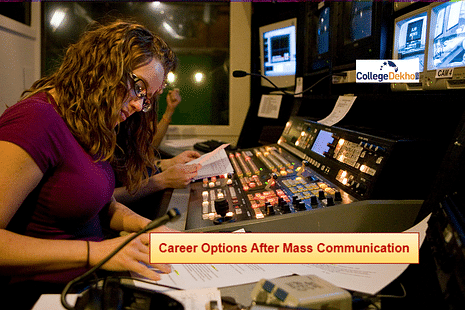
Top 10 Career Options After Mass Communication:
A degree in Mass Communication can lead to a variety of professions, including those in public relations, journalism, content writing, film-making, legal affairs, digital marketing, fashion photography, event management, and more. Many students prefer master's programmes even though many enter the field right away after earning their bachelor's in journalism and mass communication.
The best feature about this field is that aspirants from any background can develop a career in any of these professions simply by pursuing a master’s degree in Mass Communication; a bachelor’s degree in this discipline is not mandatory to begin as a fresher in the domain. Students who complete internships as part of their master's degree programmes benefit professionally and acquire essential skills.
Graduates can choose the kind of job profile they want to opt for in this field by learning about the various career opportunities available to them after earning a degree. The usage of broadcasting networks like Netflix, Hotstar, Amazon Prime, etc. has increased significantly as more companies now operate from home and people have more spare time.
Top 10 Jobs After Pursuing Mass Communication
The details of the 10 popular careers after pursuing Mass Communication are discussed below:
Journalist: Investigating, compiling, and delivering newsworthy information about diverse past, present, and future events is the main responsibility of a journalist. Journalists conduct research, create news stories, features, and articles, then edit, proofread, and publish them. Because they are dedicated to uncovering the truth and disseminating it to the public, journalists are obliged to offer a rational viewpoint. Journalists must first gather information before they can write on a topic. They frequently interact with a variety of individuals who are knowledgeable or involved in the subject.
Digital Marketer: A digital marketer plans, executes, manages, and supervises marketing operations across various digital networks to promote companies, products, and services. All web, SEO/SEM, database marketing, email, social media, and display advertising campaigns are planned and carried out by digital marketers. They create, develop, and manage a company’s online presence. They also evaluate the performance of all digital marketing initiatives in relation to goals (ROI and KPIs) by analyzing them and preparing reports on them. To increase brand recognition, impact, and loyalty, they need to be able to recognize trends. Based on campaign budgets, metrics, and market reports, digital marketers create new and creative digital projects and strategies for growth.
Graphic Designer: Graphic designers plan and create graphical designs and artwork using hand tools, computers, and design software and choose colours, imagery, and typefaces to reflect a company's identity and mission. They are also responsible for demonstrating design ideas to clients or the art director. They establish project schedules and determine budget constraints. After conducting research on the subject, they create preliminary sketches and then develop them into finalized works that meet the necessary standards for size, composition, style, and color combination. They produce designs for publications such as books, magazines, brochures, posters, manuals, websites, ads, logos, etc.
Public Relations Account Executive: Different client accounts in print, television, and online media are managed by a public relations account executive. Typically, they collaborate with PR agencies or the PR departments of large organizations. They carry out the necessary market, consumer, and industry research while adhering to customer specifications, and identifying the customer's objectives and target audience. They create PR strategies that fit the requirements and budget of their clients and then submit them for approval.
Event Manager: They are responsible for the organization, management, execution, and supervision of a variety of private and public events like family events, professional events, conferences, seminars, award ceremonies, sports events, celebratory events, and promotional events, etc. Clients and event managers meet to discuss the goals, requirements, and budget of the event. Their duties include selecting and booking venues and procuring permits. They might also take care of logistics, negotiate with sponsors, and coordinate with vendors. They also update senior management, manage branding and communication, and develop event feedback surveys.
Film Director: The duties of a film director consist of participation in casting sessions and selection of actors, analyzing a script, and figuring out the narrative's purpose, style and plot. To guarantee that actors are following their artistic vision, they also monitor rehearsals. Film directors also determine the filming locations for each scene. They follow a production plan to ensure the movie is finished on time and operate within budgetary constraints if necessary. To ensure a consistently creative implementation, film directors work with a camera crew, art directors, costume designers, and a composer.
Radio Jockey/ RJ: The primary responsibility of an RJ is to keep the audience entertained with his/her exceptional conversational abilities and admirable sense of humour. Additionally, he/she will have the option to use the wide audience of the radio as a tool for social change on both local and global scales. Radio Jockeys are responsible for preparing scripts for radio shows, organizing music for broadcasting, developing programme schedules, interviewing celebrities and other guests, and updating the audience with news, weather reports, sports traffic, and other current events.
Media Planner: They collaborate with the agency accounts staff to make sure that campaign ideas, plans, and goals are translated into executable tasks. Using pre-established marketing objectives, media planners create action plans for advertising campaigns. They decide which media platforms will best promote the advertised brand or product. Working closely with clients, consumers, advertising staff and co-workers is a crucial aspect of the profession. Media planners produce financial and media plans and forecasts, conduct market research to determine the target audience, analyze and interpret data, and produce briefs for media buyers.
Director of Communications: They are public relations professionals who monitor the information flowing from an organization to its customers. Apart from managing a team to provide timely responses, they are also responsible for monitoring the organization’s marketing strategy. They establish media relations and make connections with journalists, community leaders, and influencers. They also create a brand voice and uphold the brand integrity across all platforms and ensure compliance while creating a budget for the communications team.
Content Writer: Writing for websites, blogs, white papers, ads, manuals, brochures, social media posts, commercials, and product descriptions are the primary responsibilities of a content writer. To generate original content, they conduct extensive research on topics pertaining to the sector. They are also responsible for aiding the marketing team in the creation of advertising campaign content. A target audience and a clear agenda are typically present in the content they publish. They also proofread the written content for flaws and discrepancies and enhance the readability of existing content through editing and polishing. In order to improve traffic to the company website, keyword research and the most effective SEO practices are used by them.
Other Job Profiles After Mass Communication
Several media organizations and corporate houses offer the following jobs to graduates in Mass Communication:
Content Editor | Screenwriter |
|---|---|
Producer | Sound Engineer |
Sound Mixer and Sound Recordist | Event Manager |
Art Director | Cameraman |
Video Jockey (VJ) | TV Correspondent |
Photographer | Technical Communication Specialist |
Web Producer | 3-D & Animation Specialist |
Professor | Graphic and Design |
Top Recruiters for Mass Communication Graduates
The most popular companies offering employment to graduates in Mass Communication are listed below:
- Hindustan Times
- The Times Group
- Outlook
- The Pioneer
- The Hindu
- India Today Group
- Malayala Manorama
- Jagran Prakashan Group
- India TV
- Zee Network
- NDTV
- Network 18
- All India Radio (AIR)
- Doordarshan (DD)
- Indian Express
Salary After Mass Communication in India
Individuals become eligible for the following salaries after pursuing Mass Communication:
Job Profile | Annual Salary (in INR) |
|---|---|
| Content Writer | 3,00,000 - 6,00,000 |
| Digital Marketer | 6,40,000 |
| Journalist | 3,45,000 |
| Radio Jockey | 3,00,000 - 7,50,000 |
3,00,000 - 5,00,000 | |
Sound Engineer | 3,00,000 - 9,00,000 |
Sound Mixer and Sound Recordist | 3,00,000 - 9,00,000 |
| Art Director | 4,00,000 - 17,20,000 |
| Event Manager | 3,80,000 - 10,00,000 |
Technical Communication Specialist | 4,70,000 - 22,00,000 |
| Photographer | 3,00,000 - 6,60,000 |
| Media Planner | 4,10,000 - 8,70,000 |
Director of Communications | 28,00,000 |
Also Read:
Best Career Options After B.Com- Eligibility, Salary, Top Colleges
An individual with a degree in Mass Communication can expect to make an average salary of INR 4.78 to 6 LPA. However, the salary could differ depending on a number of factors, such as qualification, experience, job description, etc. Globally, the sector of mass communication is developing at an astounding rate.
In contrast to the affluent nations of the West, India has seen simultaneous growth in all forms of mass communication, including print, television, radio, movies, and the internet. This growth is predicted to continue in the near future. Thus, complementing a bachelor’s degree with a master's degree in journalism and mass communication might pave the way for a very profitable career with the potential for advancement.

















Similar Articles
Top 10 Film Schools in India for 2024: Film Making Courses, Fees, Admission, Career Scope
Types of Journalism - Which is Right for You?
List of Mass Communication Courses after 12th: Eligibility, Top Colleges, Fees, Jobs
Top Companies That Hire Mass Communication graduates
SET BA Mass Communication 2024 Admission: Eligibility Criteria, Application Form, Exam Pattern, Fee Structure
Career Options in Film Studies Degree